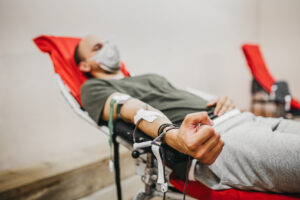Blood donations increased, especially from new donors, during 9/11 in the U.S., recent bushfires in Australia, and other major crises. Researchers in the Netherlands analyzed new blood donations during the start of COVID-19 pandemic from January to May 2020 when individuals were urged to stay home, physically distance, and limit social contacts. Fewer donations from new donors were collected during the first 8 weeks of 2020 in the Netherlands compared to 2018 and 2019. However, after the first SARS-CoV-2 infection was reported in week 9 in the Netherlands, new donations rapidly increased and peaked during weeks 13 and 16 (N=4226 and N=4123, respectively) compared with an average of 1177 and 767 new donors, respectively, during the same weeks in 2017-2019. By week 20, blood donations in 2020 were comparable to donations in 2017-2019. New donors during weeks 11-20 of 2020 in the Netherlands were more likely to be older compared to previous years (p<0.001), and newly registered donors were more likely to be from providences most affected by COVID-19. Furthermore, the peak at week 16 and a smaller peak at week 19 of new donors corresponded to increased media (Facebook, Instagram, Twitter, and newspapers) about donating blood. Additional monitoring is needed to determine if these new donors will become repeat donors.
Show Comments
Comments on this article are closed.

